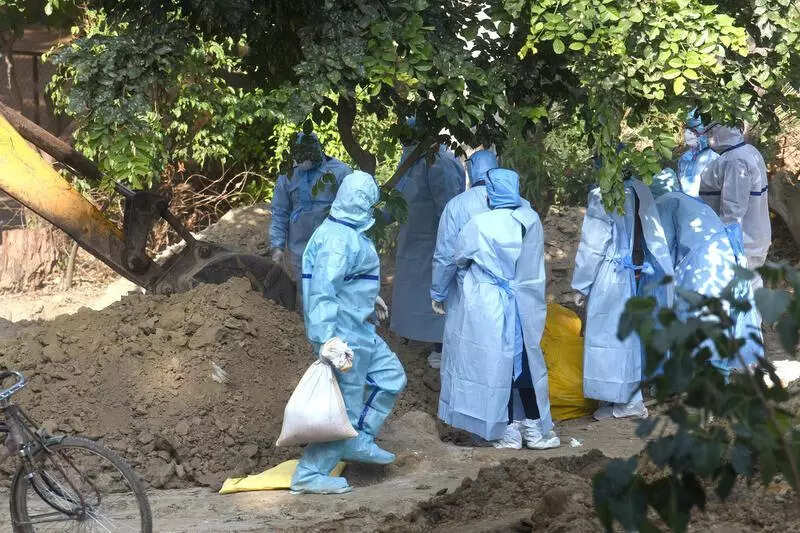Andhra Pradesh on high alert after 2-year-old girl dies of bird flu | Hyderabad News

Vijayawada: A two-year-old girl from Narasaraopet town in Andhra Pradesh’s Palnadu district has died from avian influenza (H5N1) after the child’s parents gave her a piece of raw chicken to eat. Her death marks the state’s first documented human fatality from bird flu and the second in India — after a case in Haryana in 2021.
The girl was admitted to AIIMS-Mangalagiri with symptoms of bird flu on March 4 and died on March 16. The case came to light on Wednesday after officials reconfirmed her swab test results.
National Institute of Virology (NIV) in Pune and Virus Research and Diagnostic Laboratory (VRDL) in Guntur identified the presence of H5N1 in her samples.
The state govt declared a state of high alert, directing all district medical and health officers to conduct fever screenings in vulnerable areas. “We are also looking for people with unusual symptoms,” said principal secretary (health) MT Krishna Babu.
However, officials assured the public there was no cause for alarm, saying the death was linked to having raw chicken rather than human-to-human transmission.
The girl’s parents said they had fed her a small piece of raw chicken on Feb 28, something they had done on previous occasions without issue. However, this time she developed severe health complications, including breathlessness and diarrhoea.
The child’s father works as a loan recovery agent at a private bank, while her mother is a homemaker. The parents first took the girl to a local hospital before transferring her to AIIMS as her condition worsened.
Doctors collected nasal swab samples on March 7, confirming influenza A at the hospital’s VRDL. Further testing at Indian Council of Medical Research (ICMR) lab in New Delhi identified the H5N1 virus, with NIV Pune reconfirming the results before the girl’s death.
Other family members who ate the cooked chicken remain healthy. Health officials collected nasal swab samples from the family and others who had purchased chicken from the same meat shop. All initial tests came back negative. “We have once again collected nasal swab samples from the family members and sent them to VRDL for analysis,” a senior health official said.
Animal husbandry director Dr T Damodar Naidu advised people to eat chicken and eggs only after cooking them thoroughly, “as the bird flu virus cannot survive at temperatures above 60 to 70 degrees Celsius”.
Health officials ruled out further spread, saying H5N1 has a short incubation period of three to four days. “As the girl died 18 days ago and no additional cases have been detected, there is no possibility of transmission,” a health official said.
AIIMS-Mangalagiri described it as a “sporadic case” rather than an outbreak and doctors said no new human infections had been reported since March 16.
The case has sparked concern across the state, particularly after the animal husbandry department recently declared Andhra Pradesh free from bird flu, citing no recorded mortality in commercial poultry farms.
“Following the child’s death, we conducted physical surveillance at all poultry farms and backyard poultry in Guntur, Palnadu, Prakasam district, and Narasaraopet town. No traces of bird flu were found in poultry,” said animal husbandry director Naidu.
The girl was admitted to AIIMS-Mangalagiri with symptoms of bird flu on March 4 and died on March 16. The case came to light on Wednesday after officials reconfirmed her swab test results.
National Institute of Virology (NIV) in Pune and Virus Research and Diagnostic Laboratory (VRDL) in Guntur identified the presence of H5N1 in her samples.
The state govt declared a state of high alert, directing all district medical and health officers to conduct fever screenings in vulnerable areas. “We are also looking for people with unusual symptoms,” said principal secretary (health) MT Krishna Babu.
However, officials assured the public there was no cause for alarm, saying the death was linked to having raw chicken rather than human-to-human transmission.
The girl’s parents said they had fed her a small piece of raw chicken on Feb 28, something they had done on previous occasions without issue. However, this time she developed severe health complications, including breathlessness and diarrhoea.
The child’s father works as a loan recovery agent at a private bank, while her mother is a homemaker. The parents first took the girl to a local hospital before transferring her to AIIMS as her condition worsened.
Doctors collected nasal swab samples on March 7, confirming influenza A at the hospital’s VRDL. Further testing at Indian Council of Medical Research (ICMR) lab in New Delhi identified the H5N1 virus, with NIV Pune reconfirming the results before the girl’s death.
Other family members who ate the cooked chicken remain healthy. Health officials collected nasal swab samples from the family and others who had purchased chicken from the same meat shop. All initial tests came back negative. “We have once again collected nasal swab samples from the family members and sent them to VRDL for analysis,” a senior health official said.
Animal husbandry director Dr T Damodar Naidu advised people to eat chicken and eggs only after cooking them thoroughly, “as the bird flu virus cannot survive at temperatures above 60 to 70 degrees Celsius”.
Health officials ruled out further spread, saying H5N1 has a short incubation period of three to four days. “As the girl died 18 days ago and no additional cases have been detected, there is no possibility of transmission,” a health official said.
AIIMS-Mangalagiri described it as a “sporadic case” rather than an outbreak and doctors said no new human infections had been reported since March 16.
The case has sparked concern across the state, particularly after the animal husbandry department recently declared Andhra Pradesh free from bird flu, citing no recorded mortality in commercial poultry farms.
“Following the child’s death, we conducted physical surveillance at all poultry farms and backyard poultry in Guntur, Palnadu, Prakasam district, and Narasaraopet town. No traces of bird flu were found in poultry,” said animal husbandry director Naidu.
















